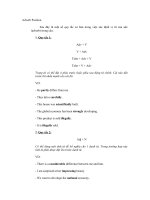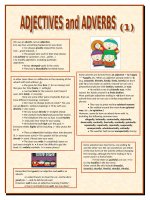Adjectives & adverbs
Bạn đang xem bản rút gọn của tài liệu. Xem và tải ngay bản đầy đủ của tài liệu tại đây (69.88 KB, 4 trang )
Revision XiI.
Adjectives & adverbs
I. Adjectives:
* Definition: Là từ dùng để miêu tả hoặc cho biết thêm chi tiết về một danh
từ, đồng thời giới hạn sự áp dụng của danh từ ấy.
* Phân loại tính từ:
- Tính từ đợc chia làm 2 loại: Tính từ mô tả (descriptive adjectives) và tính từ
giới hạn (limiting adjectives)
1. Tính từ miêu tả (descriptive adjectives) : Là những tính từ chỉ màu sắc,
kích thớc, phẩm chất... của con ngời, vật hoặc sự việc.
- Ex: good, bright, tall, short, bad, intelligent, beautiful, good looking...
2. Tính từ giới hạn (limiting adjectives): đặt giới hạn cho những từ mà nó bổ
nghĩa.
* Tính từ sở hữu ( Posessive Adjectives)
my, your, his, her, its, our, their.
- Tính từ sở hữu luôn có danh từ đi sau.
This is my ruler.
Her father is a teacher.
- Hình thức sở hữu thay đổi tuỳ thuộc vào chủ ngữ ( giống và số)
Susan has eaten her breakfast.
We have taken our baths already.
- Tính từ chỉ định ( Demonstrative adjectives)
This (này) These ( những cái này)
That ( kia) Those ( những cái kia)
I don't like these people.
I want this car, not that one.
- Các từ xác định (Determiners) có chức năng nh một tính từ. Chúng có
thể đứng trớc danh từ số ít hoặc số nhiều, đếm đợc hoặc không đếm đợc. Động
từ theo sau có thể ở hình thức số ít hoặc số nhiều, tuỳ loại.
Some ( một vài), a few ( một vài, một ít), several ( vài), many ( nhiều),
both ( cả hai), each ( mỗi), every ( mỗi), either (1 trong 2), neither ( không có
ai/gì trong hai), all (tất cả), much (nhiều), little ( ít).
a. Much, little đợc dùng với các danh từ không đếm đợc.
- We have much time to study.
- I have got little money to spend.
b. Many, few đợc dùng với các danh từ đếm đợc.
- She has got many friends.
- There are few cars in the street today.
c. A lot of, lots of, plenty of ( nhiều) dùng với danh từ số nhiều và danh từ
không đếm đợc.
- A lot of luck/ a lot of friends.
- Plenty of money/ plenty of ideas.
- Lost of time/ lots of people.
d. Much, many đợc dùng chủ yếu trong câu hỏi và câu phủ định.
- We didn't spend much money.
- Do you know many people?
e. A lot of đợc dùng trong câu khẳng định khi hơn là much, many:
- We spent a lot of money.
- He goes out a lot.
f. Much , many đợc dùng trong câu khẳng định khi đi với các trạng từ :
very, too, so.
- There are too many people at the meeting.
- I like him so much.
g. Little, few mang nghĩa phủ định ( không đáng kể).
- We must be quick. There is a little time. (not much/ not enough time)
- He isn't popular. He has few friends. ( not many)
h. A little, a few có tính khẳng định nhiều hơn.
- Let's go and have a drink. We've got a little time before the train
leaves.
- I enjoy my life here. I have a few friends and we meet quite often.
i. Each, every dùng với danh từ số ít.
- Every time I see you, you look different. ( Each time)
- There's a telephone in each room of the house. ( every room)
j. The other + noun số ít: có nghĩa là cái thứ hai trong hai cái.
- The post office is on the other side of the street.
k. The other + noun số nhiều: có nghĩa là những cái còn lại, phần còn lại,
ngời còn lại.
- When I returned home I found my wife talking to our neighbour. The
other guests had gone.
l. Another + noun số ít: có nghĩa là một cái khác.
- I must find myself another job.
m. Both, either, neither đợc dùng để nói đến hai ngời hoặc hai vật, sự
việc:
- Both men were interested in the job.
- Neither restaurant is expensive.
- We can go to either restaurant. I don't mind.
*Note:
- Many = a large number of/ a good number of
- Many= a great deal of/ a large quatity of
3. Tính từ có đuôi -ing & ed (Participles functioning as adjectives).
Jane does the same work every day and she is fed up with her work.
- Jane is bored with the work because her work is boring.
Ta nói ai đó -ed vì cái gì đó -ing.
I am interested in the film.
The film is interesting.
Có rất nhiều cặp tính từ có tận cùng bằng "ing" hoặc "ed":
interesting interested quan tâm
boring bored chán
exciting excite háo hức
fascinating fascinated hấp dẫn
amusing amused làm vui thích
amazing amazed sửng sốt
astonishing astonished ngạc nhiên
shocking shocked sốc
disgusting disgusted ghê tởm
ambarrasing embarassed xấu hổ
confusing confused lúng túng
horrifying horrified rùng rợn
terrifying terrified hoảng sợ
frightening frightened kinh hãi
depressing depressed buồn rầu
worrying worried lo lắng
annoying annoyed làm phiền
exhauting exhauted kiệt sức
satisfying satisfied vừa lòng
Exercise 1
Fill in the gaps with adjective: -ing or -ed:
1. Tom is __________in politics. ( interested/ intereting)
2. Tom find politics__________( interested/ intereting)
3. Are you __________ bying a car? ( interested/ intereting)
4. Did you meet anyone __________ at the party? ( interested/ intereting)
5. Every one was __________ that he passed the examination.( surprised/
surprising)
6. It was quite __________ that he passed the examination. .( surprised/ surprising)
7. I was __________with the film. I expected it to be much better. ( disappointed/
disappointing)
8. The film was __________. I expected it to be much better. ( disappointed/
disappointing)
9. He was very __________ when he gets home from work. ( tired/tiring)
10. He has a very __________ job.( tired/tiring)
Exercise 2
Complete these sentences with an adjective: -ing or -ed. The first letter(s) of
the adjective are given each time:
1. I seldom visit art galleries. I'm not very i.................................. in art.
2. We went for a very long walk. It was very t...........................
3. Why do you always look so b.................? Is your life really so
b............................?
4. He's one of the most b....................people I've ever met. He never stops
talking and never says anything i............................. .
5. I was a........................... when I heard they were getting divorced. They had
always seem so happy together.
6. I'm starting a new job next week. I'm quite e........................ about it.
7. I enjoyed the football match. It was quite e.................................
8. The kitchen hadn't been cleaned for ages. It was really dis............................
9. Do you easily get em.................................?
10. It was a really te...........................experience. Afterwards everybody was
very sh.........









